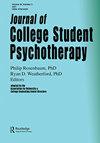性创伤患者的初始痛苦、痛苦变化及结束治疗的原因
IF 1.1
Q3 PSYCHOLOGY, APPLIED
引用次数: 1
摘要
摘要本研究比较了性创伤患者和非性创伤患者在治疗前的痛苦和治疗过程中痛苦的变化。治疗结束的原因也被检查。这项研究的数据来自139所大学的心理咨询中心。采用心理症状咨询中心评估量表测量心理困扰;使用临床医生客户关注指数确定提出的关注;使用标准终止表格测量治疗结束的原因。MANOVA被用来测试治疗开始时心理困扰的差异,MANCOVA被用来检查整个治疗过程中的心理困扰。卡方检验用于检验是否存在导致治疗终止的不同原因。经历过性创伤的来访者在接受治疗时表现出明显更高的痛苦水平,但表现出更大的痛苦变化。与治疗结束相关的原因无统计学差异。本文章由计算机程序翻译,如有差异,请以英文原文为准。
Initial Distress, Changes in Distress, and Reasons for Ending Therapy in Clients Affected by Sexual Trauma
ABSTRACT This study compared pre-treatment distress and the changes in that distress over the course of therapy between sexual trauma clients and non-sexual trauma clients. Reasons for therapy ending were also examined. Data for this study were collected at 139 university counseling centers. Psychological distress was measured using the Counseling Center Assessment of Psychological Symptoms; presenting concerns were determined using the Clinician Index of Client Concerns; and reason for end of treatment was measured using a standardized Termination Form. MANOVA was utilized to test differences in psychological distress at the start of therapy and a MANCOVA was used to examine psychological distress over the course of therapy. Chi-square tests were used to examine if different reasons existed for why treatment ended. Clients that experienced sexual trauma presented to treatment with significantly higher levels of distress but demonstrated greater distress change. No statistical differences in reasons associated with the end of treatment.
求助全文
通过发布文献求助,成功后即可免费获取论文全文。
去求助
来源期刊

JOURNAL OF COLLEGE STUDENT PSYCHOTHERAPY
PSYCHOLOGY, APPLIED-
CiteScore
3.20
自引率
7.10%
发文量
16
期刊介绍:
The Journal of College Student Psychotherapy® is dedicated to enhancing the lives of college and university students by featuring high-quality articles about practice, theory, and research in mental health and personal development. Contributions to the journal come from professionals in the field of mental health and counseling and from college staff, faculty, and students. The journal is written specifically for college and university administrative staff and faculty as well as counselors and mental health professionals. Regular quarterly issues of the journal feature articles of central interest to psychotherapists and counselors while also expressing broader implications for everyone who wishes to understand students.
 求助内容:
求助内容: 应助结果提醒方式:
应助结果提醒方式:


